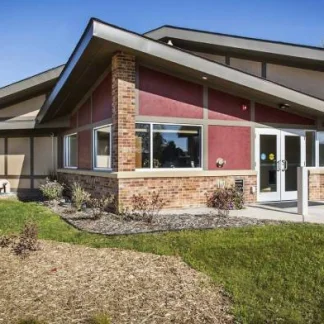AA - Alcoholics Anonymous - 770th Avenue
AA – Alcoholics Anonymous – 770th Avenue is a non-profit rehab located in River ...
The Kinnic Falls commitment is a recovery program that leads to the discovery of a rewarding new life free from the use of mood-altering chemicals. Kinnic Falls' program is designed for individuals seeking recovery from alcohol and chemical dependency who have completed treatment at primary care centers and desire supportive rehabilitation services to achieve long-term sobriety.
Contact us for more information: (715) 426-5950

Connect with Kinnic Falls by calling their admissions team directly.
(715) 426-5950 Website Get DirectionsCognitive Behavioral Therapy (CBT) is a therapy modality that focuses on the relationship between one's thoughts, feelings, and behaviors. It is used to establish and allow for healthy responses to thoughts and feelings (instead of unhealthy responses, like using drugs or alcohol). CBT has been proven effective for recovering addicts of all kinds, and is used to strengthen a patient's own self-awareness and ability to self-regulate. CBT allows individuals to monitor their own emotional state, become more adept at communicating with others, and manage stress without needing to engage in substance abuse.
Group therapy is any therapeutic work that happens in a group (not one-on-one). There are a number of different group therapy modalities, including support groups, experiential therapy, psycho-education, and more. Group therapy involves treatment as well as processing interaction between group members.
In individual therapy, a patient meets one-on-one with a trained psychologist or counselor. Therapy is a pivotal part of effective substance abuse treatment, as it often covers root causes of addiction, including challenges faced by the patient in their social, family, and work/school life.
Group therapy is any therapeutic work that happens in a group (not one-on-one). There are a number of different group therapy modalities, including support groups, experiential therapy, psycho-education, and more. Group therapy involves treatment as well as processing interaction between group members.
In individual therapy, a patient meets one-on-one with a trained psychologist or counselor. Therapy is a pivotal part of effective substance abuse treatment, as it often covers root causes of addiction, including challenges faced by the patient in their social, family, and work/school life.
In individual therapy, a patient meets one-on-one with a trained psychologist or counselor. Therapy is a pivotal part of effective substance abuse treatment, as it often covers root causes of addiction, including challenges faced by the patient in their social, family, and work/school life.
AA – Alcoholics Anonymous – 770th Avenue is a non-profit rehab located in River ...